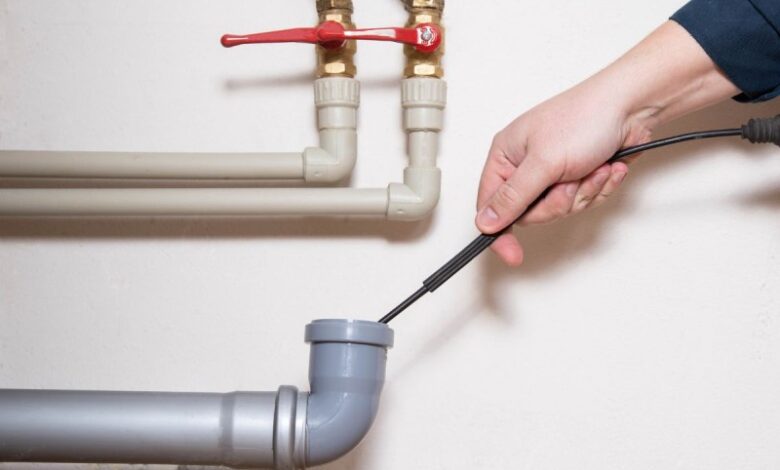How Sewer Line Cleaning Prevents Costly Plumbing Issues: A Homeowner’s Guide

As a seasoned plumbing professional in Estes Park, Colorado, I’ve seen firsthand how regular sewer line cleaning can save homeowners significant amounts of money. Many homeowners don’t realize that a clean sewer line is the key to preventing expensive plumbing issues like backups, clogs, and even full system failures. Taking proactive measures, such as scheduling routine sewer line maintenance and inspections, can go a long way in maintaining a healthy home plumbing system. In this article, I’ll discuss how regular sewer line cleaning is an essential practice that can prevent future costly repairs and help you avoid the stress of plumbing emergencies.
Why Sewer Line Cleaning Matters
Your home’s sewer line is responsible for carrying wastewater from your home to the municipal system or your septic tank. Over time, debris, grease, and tree roots can build up in the line, leading to blockages and reduced flow. Sewer line cleaning helps remove these obstructions and ensures that your system works efficiently. In Colorado, where winter temperatures can freeze pipes and natural elements can strain older systems, it’s especially important to stay ahead of potential issues.
The Benefits of Routine Sewer Line Cleaning
Regular cleaning is a proactive way to protect your plumbing system. By removing buildup and debris before it causes a major issue, you avoid emergency repairs, such as pipe bursts or extensive damage to your property. Routine cleaning ensures your system works efficiently, which helps to:
- Prevent sewer backups: Blockages can lead to water backing up into your sinks, showers, or toilets, creating a mess and posing health risks.
- Avoid clogs: Regular cleaning helps prevent the buildup of grease, hair, and other substances that lead to clogs and slow drainage.
- Increase the lifespan of your plumbing: Routine maintenance ensures that your sewer line remains free from debris that could damage your pipes, extending their longevity.
Common Causes of Main Sewer Line Clogs
Several factors can contribute to main sewer line clogs. Here are the most common culprits:
- Tree roots: In areas like Estes Park, where mature trees are abundant, their roots can penetrate sewer lines in search of water. These roots cause cracks or clogs, restricting water flow and leading to more serious issues.
- Grease buildup: Many homeowners unknowingly pour grease down their drains, which solidifies in the pipes and builds up over time, causing a slow drain or total blockage.
- Foreign objects: Items like paper towels, hygiene products, and even toys can end up in the sewer line, obstructing water flow.
- Aging pipes: Over time, older pipes can corrode or collapse, causing significant issues that need immediate attention.
By scheduling professional sewer cleaning, you can address these issues before they become expensive problems.
The Sewer Line Inspection Process
Before performing any cleaning or repairs, it’s important to conduct a thorough sewer line inspection. This allows plumbers to identify any potential issues, such as cracks, corrosion, or tree root infiltration. Inspection tools like cameras help professionals see the inside of your pipes, ensuring that the cleaning process is effective and that no underlying problems are missed.
How Sewer Line Cleaning Works
There are several methods for sewer line cleaning, depending on the severity of the problem. One common and effective method is hydrojetting, which uses high-pressure water to clear debris and buildup. This method is highly effective because it not only removes blockages but also scours the sides of the pipes, preventing future buildup.
If you’re wondering how much it costs to hydrojet a sewer line, the price can vary depending on the complexity of the job and the condition of the pipes. However, it’s important to remember that this is a small investment compared to the potential cost of major repairs caused by neglected lines. Hydrojetting is a safe, cost-effective solution for maintaining the health of your sewer line.
How Often Should You Schedule Sewer Line Cleaning?
In Estes Park, the unique environment and seasonal changes can affect your plumbing system. Tree roots, cold weather, and heavy rainfall can all cause strain on your sewer lines. As a general rule, it’s recommended to schedule sewer line cleaning every 18 to 24 months, but if you’re experiencing slow drains or frequent backups, you should consider more frequent cleaning.
Sewer and Drain Cleaning Services from a Professional Plumber
While DIY methods like using drain cleaners may seem tempting, they’re often not effective for cleaning main sewer lines. Professional sewer cleaning services ensure that your lines are properly cleared, minimizing the risk of future issues. A plumber sewer line cleaning service will have the right tools and expertise to handle any problems, from minor clogs to more serious blockages. The investment in professional plumbing services pays off in the long run by preventing costly repairs and headaches.
Cost of Professional Sewer Line Cleaning
Many homeowners wonder about the cost of sewer line cleaning. While prices vary depending on factors like the size of the property and the extent of the blockage, it’s generally much less expensive than the cost of emergency plumbing repairs. It’s always a good idea to get a quote from your local plumber and discuss pricing options before proceeding with any service.
Remember, avoiding sewer line cleaning to save money can ultimately result in much higher costs down the road. Sewer line cleaning is a small price to pay to avoid major plumbing failures and the costly repairs that come with them.
Conclusion
In conclusion, sewer line cleaning is an essential part of home plumbing maintenance that helps prevent costly repairs, clogs, and backups. By staying proactive with regular inspections and cleaning, you can ensure that your plumbing system runs smoothly and efficiently. Whether you’re dealing with tree roots, grease buildup, or general wear and tear, routine cleaning and maintenance are key to preserving the health of your sewer lines and protecting your home.


